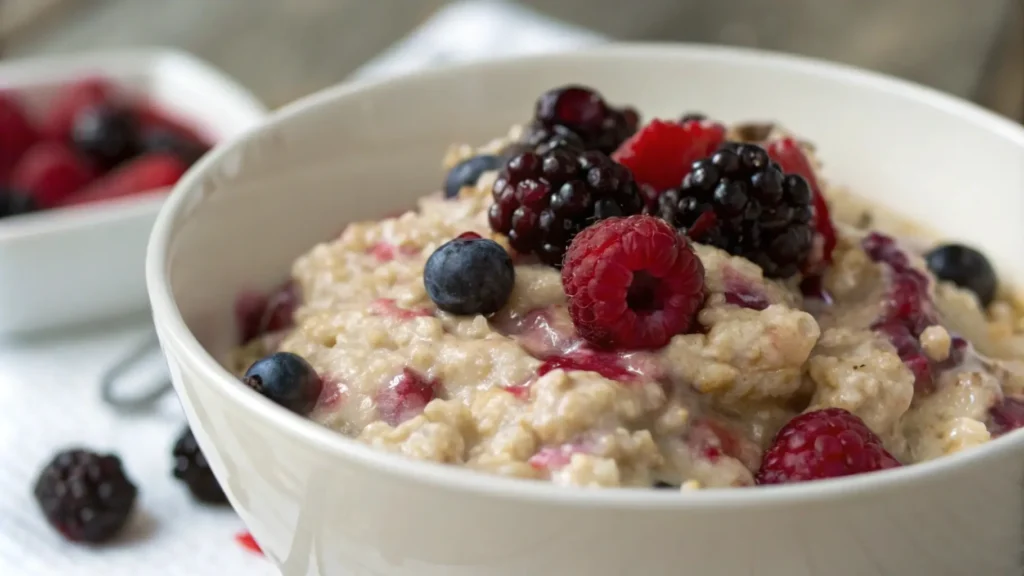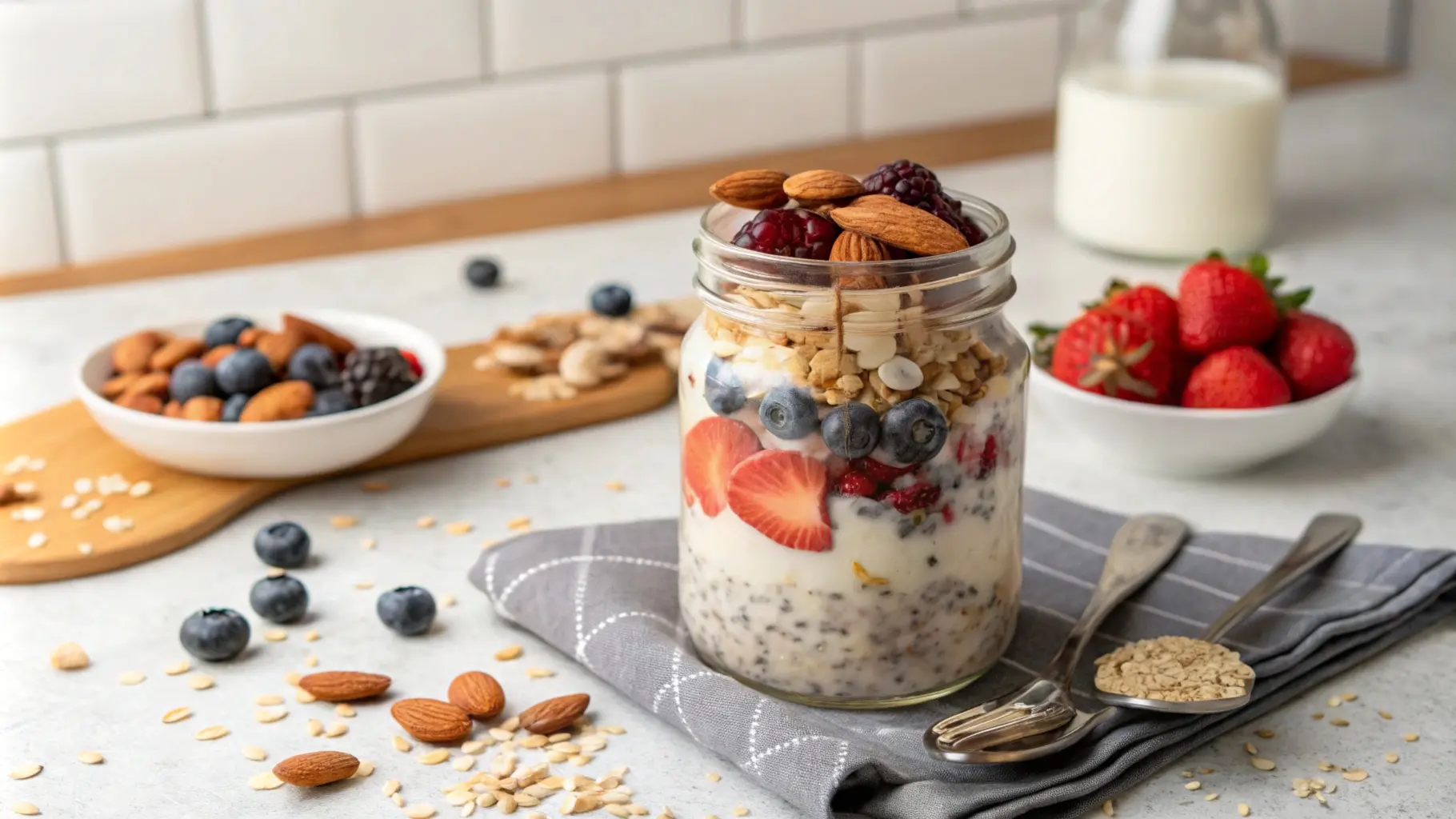Overnight oats have become the go-to breakfast for many, offering a quick, convenient, and nutritious start to the day. But here’s the kicker – not all ingredients belong in your oat jar. While it’s tempting to experiment with flavors, the wrong additions can turn your wholesome breakfast into a mushy, bland, or even unappetizing mess.
In this guide, we’ll dive into what not to add to overnight oats, uncovering common mistakes and better alternatives. From liquids that ruin the texture to fruits that spoil overnight, this article ensures your oats stay creamy, tasty, and ready to fuel your mornings. Let’s get started!
Adding Liquids Improperly
Why Water Is What Not to Add in Overnight Oats
One of the most common errors in overnight oat preparation is using plain water instead of milk. Sure, water gets the job done – it softens the oats – but let’s be honest: it leaves your oats flat, runny, and downright boring. Milk, on the other hand, adds richness, flavor, and a creamy consistency that water simply cannot replicate.
If you’re not a fan of dairy, there’s no need to worry! Plant-based milks like almond, oat, soy, and cashew milk can do wonders for your oats. For a protein-packed breakfast, opt for soy milk. Craving indulgence? Creamy cashew milk or full-fat oat milk will hit the spot. Avoid using water unless you’re in a pinch – you’ll end up disappointed with a lackluster breakfast.
The Right Milk for Perfect Overnight Oats
When choosing milk, consistency is key. Avoid overly thin liquids like skim milk unless you enjoy a runnier texture. Whole milk or creamier options like oat and cashew milk create a velvety texture that keeps the oats from tasting like soggy cereal.
Pro Tip: Experiment with flavored milks like vanilla almond milk for a hint of sweetness without extra sugar. Trust me, it’s a game-changer.
If you’re calorie-conscious, use unsweetened plant-based milks to control sugar content. Remember, your overnight oats should be balanced – not watery, tasteless, or overly sweet.
Neglecting Key Flavor Enhancers
What Not to Add in Overnight Oats? Skipping Salt
When crafting the perfect overnight oats, most people focus on adding sweeteners and fruits. But here’s the thing: forgetting to add a pinch of salt can leave your oats tasting one-dimensional. Salt may seem out of place in a sweet dish, but it works wonders by enhancing and balancing flavors.
Cold overnight oats often mute natural sweetness, making them taste dull. A small sprinkle of salt brings out the flavor in ingredients like honey, bananas, and berries, giving your oats that extra oomph. Without salt, you risk ending up with a bland, overly sweet breakfast – and who wants to start their day like that?
Tip: Use sea salt or Himalayan pink salt for a subtle, natural boost. Avoid table salt, as it can overpower delicate flavors.
Missing Spices Can Ruin Your Overnight Oats
Another mistake in overnight oats? Skipping spices and seasonings. Sure, oats, milk, and fruit are a solid base, but they can feel a little boring without flavor boosters. Adding spices like cinnamon, nutmeg, or even pumpkin pie spice transforms your oats into a warm, flavorful treat.
Cinnamon is an all-time favorite because it pairs well with almost any topping, from apples to peanut butter. For fall-inspired oats, try ginger, cloves, or cardamom for a rich, aromatic twist.
When you’re wondering what not to add in overnight oats, skipping spices should be high on the list. They’re the difference between a good breakfast and one that tastes unforgettable.
Using the Wrong Type of Oats
Why Instant Oats Become Mushy
You might think any oats will do, but using instant oats in your overnight oats is a recipe for disaster. Instant oats absorb liquid far too quickly, turning into a mushy, unappetizing mess by morning. While instant oats are fine for quick-cook recipes, they don’t hold their structure when soaked overnight.
For the best texture, stick with old-fashioned rolled oats. These oats soak up milk at the perfect rate, creating a creamy yet firm consistency.
Why Steel-Cut Oats Don’t Work Well
On the flip side, steel-cut oats are another no-go for overnight oats. They’re much harder and take significantly longer to soften, leaving you with a gritty, chewy texture the next day.
If you’re in the mood for a hearty breakfast, it’s better to cook steel-cut oats on the stovetop. But for overnight oats, old-fashioned oats strike the right balance – soft, creamy, and spoon-ready.
So, when asking what not to add in overnight oats, avoid both instant oats and steel-cut oats. Stick to the classic rolled oats for consistently great results every time.
Adding Ingredients That Spoil Overnight

Why Fresh Berries Shouldn’t Go in Early
Berries might seem like the perfect addition to overnight oats, but here’s the catch: they don’t hold up well overnight. When you add fresh berries like strawberries, blueberries, or raspberries to your oats the night before, they tend to break down and release moisture. The result? A soggy, discolored mess with none of that fresh berry flavor you were hoping for.
Instead, keep your berries separate and add them in the morning. This quick step ensures they retain their firm texture and natural sweetness. If you’re short on time, wash and prep your berries the night before, so they’re ready to toss into your oats in seconds.
If you’re asking what not to add in overnight oats, berries top the list when it comes to timing. Trust me, your morning breakfast will look and taste a lot better if you wait until the last minute.
Fruits That Do Better Overnight
Not all fruits are problematic in overnight oats. Bananas, apples, and dried fruits like raisins or dates are excellent options. Bananas soften overnight, blending seamlessly into the oats and adding natural sweetness. Apples hold their crispness, while dried fruits absorb liquid and enhance the texture.
Overlooking Texture Enhancements
Skipping Nuts and Seeds for Crunch
Texture is everything in overnight oats. While oats and milk provide the creamy base, leaving out nuts and seeds can make your breakfast feel dull and lifeless. Almonds, walnuts, pecans, and seeds like chia, flax, or pumpkin seeds add that much-needed crunch and complexity.
The best part? Nuts and seeds not only improve texture but also boost the nutrition of your oats. They’re rich in healthy fats, fiber, and essential nutrients, keeping you fuller for longer.
Pro Tip: If you’re adding crunchy nuts, wait until the morning to sprinkle them on top. This ensures they stay crisp instead of turning soggy overnight.
Yogurt for Creaminess and Protein
Another overlooked ingredient in overnight oats is yogurt. Adding a spoonful of Greek yogurt creates a creamier texture while packing in protein to keep you energized all morning. If you’re lactose intolerant, opt for dairy-free yogurts like coconut or almond-based versions.
When considering what not to add in overnight oats, skipping texture-boosting ingredients like nuts, seeds, and yogurt is a mistake you’ll want to avoid. These small additions make a huge difference in flavor, nutrition, and satisfaction.
Storing Oats for Too Long
How Long Overnight Oats Stay Fresh
When preparing overnight oats, you might feel tempted to make a big batch for the entire week. But here’s the deal: oats don’t last forever in the fridge. If they sit too long, they lose their texture, turning mushy and unappetizing. Ideally, overnight oats should be consumed within 2-3 days for the best flavor and consistency.
While oats can last up to five days in the fridge, the quality will decline by day four. The milk or yogurt may separate, and the oats will absorb too much liquid, creating a gloopy mess. If you’re wondering what not to add in overnight oats?, letting them linger for too long in the fridge tops the list of mistakes.
Why Over-Soaking Alters the Texture
Over-soaking your oats doesn’t just affect texture; it can also impact flavor. By leaving your oats for more than a couple of days, ingredients like bananas or nuts might break down, turning your breakfast into an unappetizing sludge.
The solution? Prepare your oats one or two days in advance. If you love meal prepping, keep toppings like nuts, fruits, or seeds separate to maintain their freshness. That way, every bowl of oats feels like it was made that morning – without sacrificing convenience.
Avoiding Savory Options
Transforming Overnight Oats with Savory Ingredients
While most overnight oat recipes focus on sweet flavors, savory oats are a game-changer you shouldn’t ignore. If you’re someone who prefers salty, hearty breakfasts, this is for you. Adding ingredients like broth, eggs, and avocado can transform your oats into a warm, savory dish.
Instead of using milk, swap it for chicken or vegetable broth. Add a pinch of salt, pepper, and spices like garlic powder or cumin for depth. Top your oats with a fried egg, sautéed spinach, or crispy bacon. This savory version feels more like a satisfying brunch than a sugary snack.
Protein-Packed and Seasoned Oatmeal Ideas
For those craving protein in the morning, savory overnight oats are a perfect choice. Mix in Greek yogurt or a dollop of cream cheese for creaminess, then add toppings like grilled chicken, mushrooms, or parmesan cheese. Not only do these additions boost nutrition, but they also turn plain oats into a flavorful, balanced meal.
So, what not to add in overnight oats? Limiting yourself to just sweet ingredients is a mistake. Experiment with savory options to keep your breakfasts exciting, satisfying, and full of variety. Savory oats might just become your new morning favorite!
Missing the Stirring Step
Why You Must Stir Before Eating
Even if you mixed your overnight oats thoroughly the night before, skipping a quick stir in the morning can leave you with uneven flavors and weird textures. Overnight oats naturally settle in layers as they soak, meaning that ingredients like sweeteners, spices, or chia seeds might clump together.
A quick stir before digging in redistributes everything, giving you a smooth, consistent bite every time. This step takes less than 10 seconds but makes all the difference in taste and texture.
Preventing Flavor Imbalance
Failing to stir your oats might result in an overwhelming bite of peanut butter or a clump of cinnamon powder. Stirring combines all those delicious flavors, ensuring a balanced and enjoyable breakfast.
When asking yourself what not to add in overnight oats?, don’t skip over the basics. Neglecting this simple step can ruin your otherwise perfect preparation.
Ignoring Warm Options
How to Heat Overnight Oats Properly
Many people assume overnight oats must always be eaten cold, but that’s far from the truth. If the idea of chilled oats doesn’t appeal to you, simply warm them up! A quick zap in the microwave for 30-60 seconds turns cold oats into a cozy, satisfying meal.
Warming your oats doesn’t compromise texture – in fact, it enhances the flavors of ingredients like cinnamon, nutmeg, and fruits. Just be sure to give your oats a good stir after heating to ensure even warmth.
When Cold Oats Aren’t Appealing
Cold oats aren’t for everyone, especially during colder months. By warming them up, you get the best of both worlds: a meal that’s quick and ready to go, but also comforting and filling.
If you’re wondering what not to add in overnight oats, rigid assumptions top the list. Don’t limit yourself – warming your oats is a game-changer for busy mornings.
FAQs Section
Can I Use Water Instead of Milk in Overnight Oats?
Technically, yes, but it’s not recommended. Water creates a runny, flavorless texture that lacks creaminess. Use milk – dairy or plant-based – for the best results.
How Long Can Overnight Oats Last in the Fridge?
Overnight oats stay fresh for up to 3-5 days, but the texture declines after day three. For optimal flavor, eat them within two days.
Why Are My Oats Soggy in the Morning?
Your oats might be too soggy if you used instant oats or added too much liquid. Stick to rolled oats and maintain a 2:1 ratio of liquid to oats.
What Fruits Should Be Added Fresh to Overnight Oats?
Fresh berries like strawberries and blueberries are best added right before eating to avoid mushiness. Bananas and apples, however, do well when soaked overnight.

